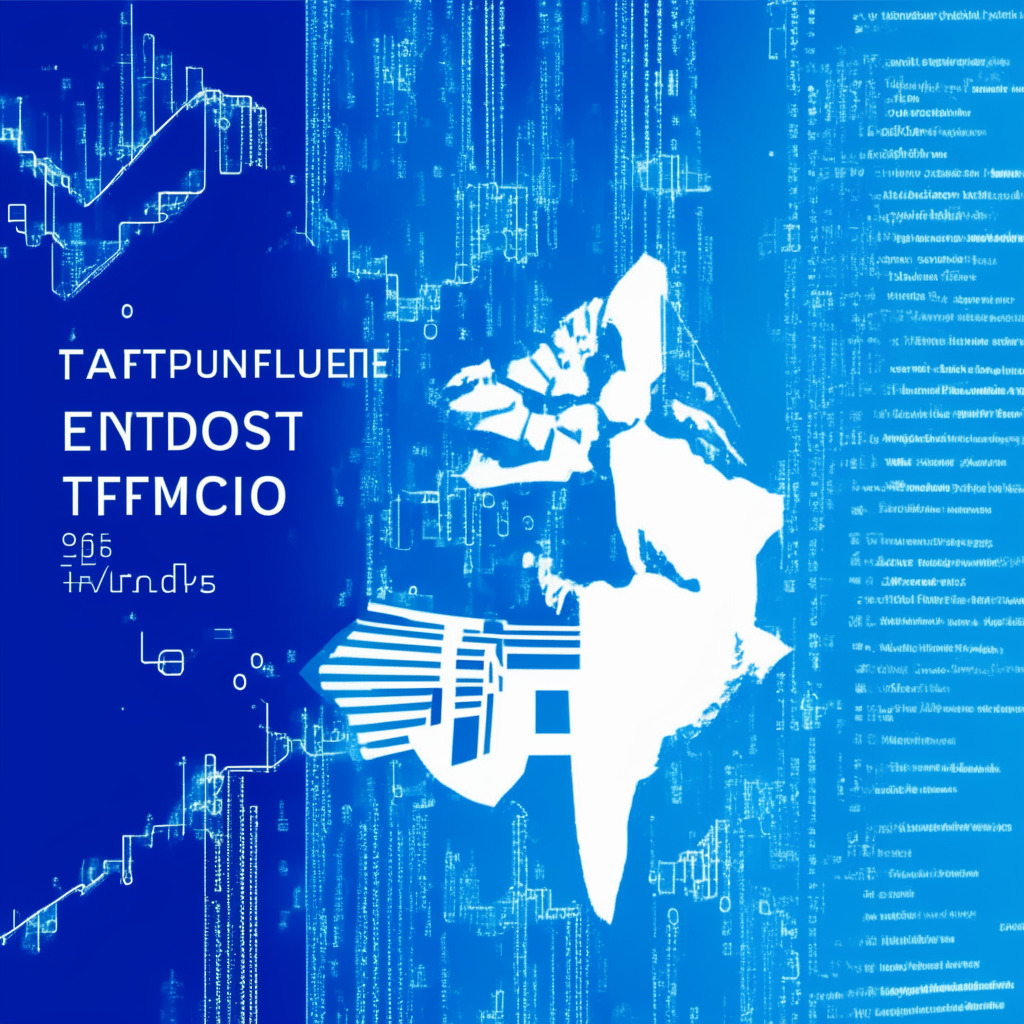The Federal Open Market Committee raised the fed funds rate by 25 basis points, moving Bitcoin’s price remained stable at around $28,600. Observers eagerly awaited indications of a pause in historic rate hikes, but recent policy statements point to potential future economic impact from tighter credit conditions, requiring further monetary policy tightening. Bitcoin continues to serve as a potential hedge against traditional market fluctuations.
Search Results for: Bitcoin 2023 Conference
Bitcoin’s Fate Amid Federal Reserve Decisions: Who Holds the Cards?
Bitcoin’s value surges 70% this year, with the Federal Reserve’s interest rate decision playing a significant role. As Jerome Powell’s announcement approaches, his clarity on the end of the tightening cycle may impact Bitcoin’s price, as Treasury yields and the U.S. dollar historically affect the cryptocurrency’s performance.
Presidential Hopeful Vivek Ramaswamy Banks on Crypto: Innovating Campaign Funding or Legal Liability?
“Up-and-coming US Republican presidential candidate, Vivek Ramaswamy, known for his pro-crypto stance, is accepting Bitcoin contributions for his campaign, reflecting the increasing influence of digital currencies in the financial landscape. However, his political journey faces potential setbacks due to legal issues with previous employees.”
Wyoming’s Revolutionary Leap: State-backed Stablecoin Project and a Hefty Paycheck Higher than the Governor’s
The US state of Wyoming plans to hire an executive director for a groundbreaking stablecoin project, a commission introduced after the Wyoming Stable Token Act was recently approved. The commission’s authority allows it to issue a US dollar-pegged stablecoin in Wyoming, redeemable for dollars in the state’s bank account. With desired qualifications including blockchain expertise and understanding of Wyoming’s legislative operations, the Commission aims to issue a stablecoin by end of 2023.
Cryptocurrency Enters US Presidential Race: Will It Define Campaign Platforms?
The upcoming US presidential elections feature candidates recognizing cryptocurrency potential in their platforms. Miami’s pro-bitcoin mayor Francis Suarez and Democratic candidate Robert F. Kennedy Jr. discuss embracing digital assets, while Republican candidate Sen. Tim Scott aims to develop a framework for them. This shift highlights digital currencies’ growing prominence in political strategy and future campaigns.
Crypto Wars: Democrats Risk Alienating Youth Voters with Anti-Crypto Stance
Crypto billionaire Cameron Winklevoss warns that the war on cryptocurrencies led by U.S. Senator Elizabeth Warren and SEC Head Gary Gensler could alienate Millennials and Gen Z, potentially impacting Democratic voter support. Not all Democrats share anti-crypto sentiment, as the debate around regulations continues to shape the political landscape.
Crypto Mining Tax Shelved: Balancing Innovation, Regulation, and Sustainability Debate
The proposed Digital Asset Mining Energy excise tax (DAME) on cryptocurrency mining is absent from the recent US debt ceiling deal, stirring debates. While proponents argue DAME could generate revenue and promote eco-friendly practices, critics warn against stifling the growing industry with taxes.
Debt Ceiling Agreement Blocks Crypto Mining Tax: A Win for the Industry or Environmental Setback?
The recent U.S. debt ceiling agreement has notably blocked the proposed Digital Asset Mining Energy (DAME) excise tax, preventing a 30% tax imposition on cryptocurrency mining firms. This outcome, seen as a victory for the crypto industry, has sparked debates around the environmental impact of crypto mining operations and the importance of addressing energy consumption concerns for a sustainable future.
Strike’s El Salvador Move: Growth or US Regulatory Uncertainty Escape?
Strike establishes its international headquarters in El Salvador, highlighting the country’s friendly crypto atmosphere compared to the uncertain regulatory climate in the United States. The move showcases the importance of a favorable regulatory environment for the growth of the global crypto ecosystem.
Institutional Adoption of Crypto: Canada’s Lead and Impact on Investment Strategies
The shift in perspective towards major cryptocurrencies has led institutional investors and fund managers to recognize Bitcoin as a “serious venue” for investment. Canada’s advanced regulation for crypto trading and its progressive approach towards launching crypto ETFs have attracted a wider range of investors, fostering interest in the digital asset market.
Strike’s Global Expansion: Pros, Cons and Challenges in the Blockchain Revolution
Strike plans to expand its Bitcoin-based payment app from the US, El Salvador, and Argentina to over 65 countries, aiming to provide global payment and remittance services to a wider audience. However, potential challenges include varying regulatory environments and consumer skepticism.
Biden’s 30% Crypto Mining Tax: Innovation Killer or Eco-Friendly Move? Pros & Cons Explored
Senator Cynthia Lummis opposes the proposed 30% tax on cryptocurrency miners in the Biden Administration’s budget for 2024, citing environmental benefits. The proposed tax has sparked debates surrounding innovation, blockchain development, and consumer protection, with concerns it may hinder cryptocurrency adoption in the US.
2024 Presidential Race: RFK Jr.’s Impact on Crypto Policy and CBDC Debate
2024 presidential race candidate Robert F. Kennedy Jr. criticizes the Biden Administration’s proposal for a 30% tax on cryptocurrency mining, arguing it hinders industry growth and stifles innovation. Kennedy also accuses U.S. financial regulators of waging “an extra-legal war on crypto” and opposes Central Bank Digital Currencies as mechanisms for social surveillance and control.
Unmasking Binance: Differentiating from FTX Collapse and Navigating Regulatory Challenges
“Richard Teng, head of regional markets at Binance, clarified that unlike the collapsed FTX, Binance’s assets are backed one-to-one, offering a safety net for users. He also revealed commitment to international norms, including MiCA regulation, and tackling regulatory hurdles to maintain complete compliance.”
The Unexpected Rise of Coinbase: Resilience Amidst Stormy Crypto Waters
Coinbase, the digital exchange platform, reported revenue figures of $708 million, exceeding the $628 million expectation. Despite a drop in transaction revenue and total trading volume, Coinbase’s shares have surged about 160% year-to-date. CEO Brian Armstrong attributes this success to operational efficiency and strategic cost cutting.
Binance Japan’s Grand Re-Entry: Analysis and Impact on Future Digital Markets
“Binance Japan, offspring of global giant Binance, is set to enroll users in Japan through its freshly introduced platform – featuring spot trading, earn products, and an NFT marketplace – after a two-year hiatus due to regulatory concerns”.
Navigating the Uncertain Economic Terrain: Are We Headed for a Recession or Bull Run?
Three main metrics can predict recessions: the yield curve, economic indicators (LEI), and the Purchasing Managers’ Index (PMI). Despite potential recession signs like a declining yield curve and PMI, other economic factors show growth, causing mixed market sentiments and complicating monetary policies. Understanding these indicators also impacts Bitcoin investment decisions.
Binance’s Return to Japan Sets August Debut Amid Shrinking Competition: A Bold Move or a Folly?
“Binance, a leading crypto exchange, plans to reintroduce its services in Japan after a two-year hiatus due to regulatory issues. Its reentry is facilitated by the acquisition of regulated crypto exchange, Sakura Exchange BitCoin. Meanwhile, rivals Coinbase and Kraken exit the Japanese market, citing ‘market conditions’.”
Binance Expansion Into Japan – A Cryptocurrency Leap or Regulatory Nightmare?
“August 2023 sees Binance confirm the rollout of its full services in Japan. This follows the May 2023 announcement of the platform and its acquisition of Sakura Exchange Bitcoin as an entry point into the Japanese market. Despite regulatory challenges globally, Binance remains hopeful about expansion.”
Navigating Crypto Volatility and Economic Optimism in a Changing Financial Landscape
“Bitcoin and other digital assets’ responses to global financial changes highlight a likely significant surge by 2023. Notable financial giants are entering the Bitcoin ETF sphere, triggering fluctuations. Amid worldwide central bank interventions and a potential influx of traditional firms, even in bear market conditions, there’s a burgeoning acceptance of crypto in mainstream finance.”
Deutsche Bank Dives into Crypto Custody: Milestone or Centralization Concern?
Deutsche Bank, with $1.3 trillion in assets, has applied for a digital asset custody platform license from Germany’s finance regulator. This move positions the bank to potentially establish a minimum viable product in 2021, signaling a significant step toward embracing digital assets in the traditional financial sector.
Fed’s Interest Rate Pause: Implications for Crypto and Inflation Risk Hedging
The US Federal Reserve’s pause in interest rate hikes signal potential future rate hikes, impacting the cryptocurrency market. Investors may turn to risky assets like Bitcoin to hedge against inflationary risks, highlighting the importance of thorough market research in volatile cryptocurrencies.
US CBDC Dilemma: Balancing Privacy, Security, and Financial Inclusion in a Digital Era
The Treasury Department leads an interagency working group studying a potential U.S. central bank digital currency (CBDC). As digital currencies gain traction, finding a balance between innovation, trust, protection, privacy, and financial inclusion is crucial for the nation’s digital financial future.
Economic News Takes Center Stage: Impact on Crypto and Financial Markets
The upcoming week shifts focus from crypto-specific events to economic news, with critical events like the US Consumer Price Index release, Federal Open Market Committee’s June meeting results, and the European Central Bank’s rate hike decision expected to significantly impact both cryptocurrency and traditional markets.
Chorus One Enters Urbit Hosting Space: A Step Towards Decentralization or Unsustainable Complexity?
Chorus One, a staking services provider for over 40 blockchains, including Ethereum, Solana, Cosmos, and Polkadot, has entered the Urbit peer-to-peer network with its launch of Red Horizon hosting platform. This move expands Urbit’s ecosystem and indicates growing interest in decentralized, peer-to-peer solutions for greater autonomy and control over personal data.
SEC Lawsuits Impact Crypto Prices: Untangling Regulatory Complexities in the US Market
Major cryptocurrencies face sharp declines due to U.S. SEC lawsuits against Binance and Coinbase, while Bitcoin remains a relative safe haven. As the cryptocurrency market navigates a complex regulatory landscape, the future of the industry and its stakeholders hangs in the balance.
Kim Kardashian’s EMAX Promotion Controversy: A Turning Point in Crypto Regulation Debate
California Judge rules Kim Kardashian’s EthereumMax promotion posts as false, affecting case against her and other public figures for misleading investors. The ongoing case emphasizes the need for accurate, transparent digital asset promotion and may influence future crypto regulation.
Ethereum Dapp Usage: Analyzing the Jimmy Song vs Joe Lubin Bet and Decentralized App Debate
In a bet from five years ago, Ethereum co-founder Joe Lubin needed to prove that five or more Ethereum-based dapps would maintain significant user activity. Blockchain data firms claim five dapps met these usage levels, but there is debate over qualification. The evolving landscape of cryptocurrency applications will continue to shape the industry, driven by innovative thinking and adoption potential.
Debt Ceiling Deal Talks Loom Over Crypto Market: Analyzing Pros, Cons & Main Conflict
As the debt ceiling deadline nears, Republican leader Kevin McCarthy expresses optimism about a deal amid market uncertainty. Financial markets, including the crypto space, are impacted by the ongoing delay in debt talks. Investors should closely monitor the situation and research before making investment decisions.
Going Infinite: Unraveling FTX’s Collapse and the Future of Crypto Regulation
Michael Lewis’ upcoming book, Going Infinite: the Rise and Fall of a New Tycoon, explores the downfall of FTX crypto exchange and Sam Bankman-Fried’s criminal trial. The book reveals insights into the importance of prudence and safety in the rapidly evolving cryptocurrency industry.
Marathon Digital’s Strategy in Bear Market: Navigating Price Protection and Energy Efficiency
Marathon Digital Holdings navigates bear market with a price protection strategy and increased hash rate, achieving a quarterly record of 2,195 BTC mined. The company’s energy-efficient fleet and foreign partnerships, like the joint venture in Abu Dhabi, help position it for ongoing expansion.
Twitter Partners with eToro: A New Era for Social Media and Crypto Trading Integration
Twitter partners with financial service provider eToro, enabling users to trade cryptocurrencies and stocks directly on the platform, marking a significant development in digital finance. The collaboration emphasizes the continual integration of social media and digital finance, creating new opportunities and challenges while highlighting the need for improved self-regulation practices in the industry.































